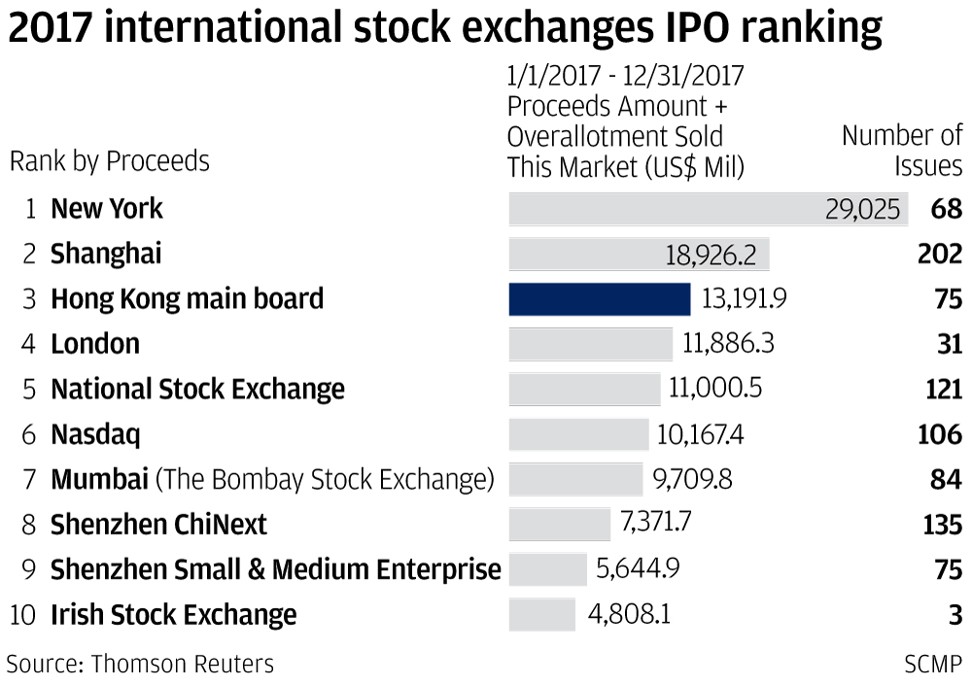The gloves are off in Hong Kong’s fight with mainland exchanges for global fundraising crown

The stock exchanges of Shanghai and Shenzhen are pulling out all stops in offering themselves as the preferred destination for new-economy companies to raise capital, upping the ante in their competition with Hong Kong for the global crown in initial public offerings.
In the last few weeks since January, exchange officials of Shanghai and Shenzhen have visited private equity investors on the mainland and in Hong Kong, inquiring about the number of technology start-ups and biotech research teams in their portfolios who need to raise funds, according to several asset managers interviewed by the South China Morning Post.
“There will certainly be competition between the mainland and Hong Kong bourses,” said Gary Cheung, chairman of the Hong Kong Securities Association, an industry guild of stockbrokers.
“Hong Kong has the advantages of an internationally accepted legal framework, and the freedom of fund flows that would attract technology firms seeking to raise funds to finance their overseas acquisitions.”
The Shanghai bourse was instructed by the China Securities Regulatory Commission (CSRC) to compile a list of “unicorns” - start-ups valued at more than US$1 billion - and has been actively persuading them to list in the city’s exchange, according to two officials familiar with the matter.
The search was for start-ups engaged in biotech, smart manufacturing, and artificial intelligence, they said. The Ministry of Science & Technology identified 131 unicorns for attention, including smartphone maker Xiaomi, and online payments platform Ant Financial Services, according to a copy of the 42-page report obtained by the Post.
China’s securities regulator himself stepped into the fray. The Chinese authorities will “create many tools, or put in a suitable system” to allow overseas-listed unicorns to offer A shares on mainland bourses, said the CSRC’s chairman Liu Shiyu, during China’s annual legislative meetings last week in Beijing.
To underscore Liu’s pledge, the CSRC approved the 21 billion yuan (US$3.3 billion) capital-raising application last week by Foxconn Industrial Internet - a unit of the world’s largest contract maker of consumer electronics - in 21 working days, a record for listing applications that could take as long as two years.
“The message is clear that tech start-ups and biotech companies are welcomed and encouraged to launch IPOs on the mainland,” said Shanghai Ronghe Law Firm’s partner Gong Zhenhua, the legal adviser to several start-ups aiming to list. “Companies that are hungry for capital can’t afford to wait too long if they want to keep their business development plans on track.”
The stakes are high for Hong Kong, which was surpassed in 2017 for the first time by Shanghai in both the number of IPOs and the amount of capital raised.
As many as 202 companies raised a combined US$18.92 billion in Shanghai, compared with 75 companies raising US$13.19 billion on the main board in Hong Kong. New York took the global crown with US$29.025 billion raised by 68 companies, according to Thomson Reuters’ data.
To catch up, Hong Kong’s stock market regulator and operator last year pushed through the biggest overhaul of their listing regulations in three decades, opening the door for listings by companies with multiple classes of stocks - typically technology start-ups - and biotech firms with little or no sales revenue.
When the Hong Kong Exchanges & Clearing Limited (HKEX), the market operator, got wind that mainland Chinese exchange officials were proactively going after unicorns and pre-revenue biotech start-ups, it brought forward its deadline for completing its regulatory overhaul by two months to the end of April.
Beijing’s overture to tech firms triggers a tug of war between mainland and Hong Kong bourses“There was concern that Hong Kong may lose out if we act too slowly,” said a source who’s familiar with the deliberations between the HKEX and the Securities and Futures Commission (SFC), the regulator, declining to be identified. “This is why the commission supported a shorter-than-normal consultation period.”
Large IPOs are much sought after, especially for HKEX, which is itself a company listed on the city’s exchange. More important than the listing fees is the daily turnover brought by companies the size of Xiaomi or Alibaba Group Holdings. The daily turnover of Alibaba, still the record holder with its US$25 billion New York IPO in 2014, is equivalent to a quarter of all transactions on the entire Hong Kong bourse.
Alibaba, the Chinese operator of the world’s largest e-commerce platform, is working on a plan to list in its home country, the Wall Street Journal reported, citing people familiar with the matter.
“Since our IPO in the US, we have stated that if regulations allow, we would consider a listing in China,” said a spokesperson at Alibaba, which owns the Post.
Hong Kong also faces competition from Singapore, even though the Southeast Asian city state wasn’t even among the Top 10 of global IPO destinations last year. Singapore had been making aggressive moves to revamp its listing rules, getting a step ahead of Hong Kong in passing legislation to allow for the listing by so-called variable interest entities (VIE), or companies with multiple classes of shares.
Singapore is Hong Kong’s rival, not Shanghai or Shenzhen, when it comes to attracting unicorns to raise funds, said SFC’s chairman Carlson Tong Ka-shing.
It’s not merely a matter of speedy approvals. Shanghai-listed stocks trade at an average of nearly 17 times earnings, while Shenzhen’s are even higher at 31.4 times, compared with the 14 times in Hong Kong. A higher price-earnings ratio allows companies to raise more funds at higher valuations.
Even so, a listing on a mainland bourse may not be preferred by shareholders that need to exit the market, since there are more restrictions and moratoria on stock sales, said Christopher Cheung Wah-fund, the Hong Kong lawmaker who represents the city’s stockbrokers.
Still, the pie may just be big enough to feed every market operator, said a regulatory official.
"In fact, these companies are so big that they could list in both Hong Kong and the mainland," he said.
With additional reporting by Enoch Yiu in Hong Kong, Xie Yu in Beijing
